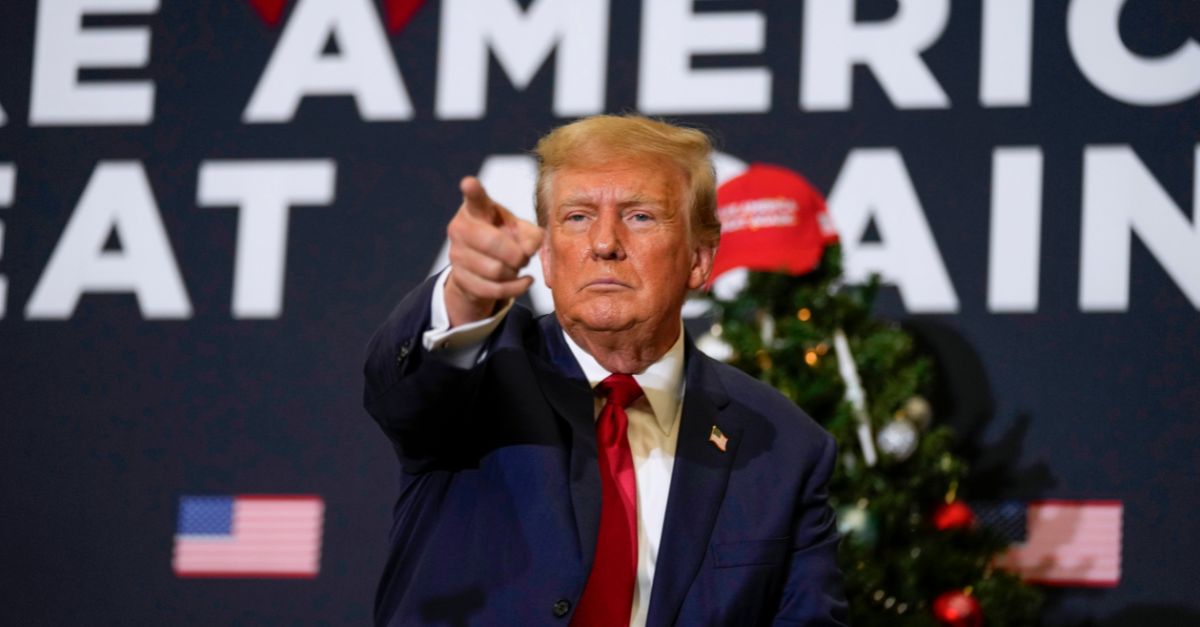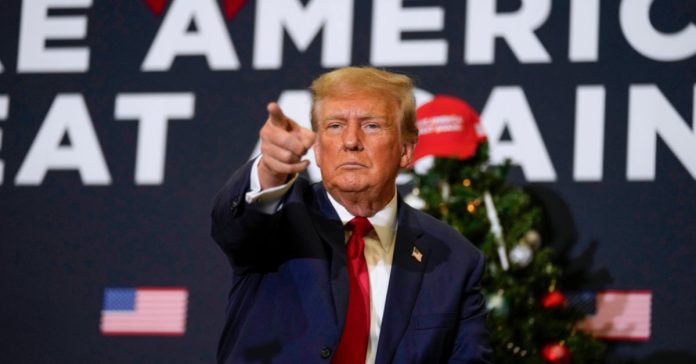
Former President Donald Trump points to supporters during rally Dec. 19, 2023, in Waterloo, Iowa. (AP Photo/Charlie Neibergall, File)
Seeking a ruling that would find him immune from any criminal prosecution when operating under his “official duties” as president, lawyers for Donald Trump have entered their last filing before oral arguments get underway next week in front of the appeals court in Washington, D.C.
The arguments are set for Jan. 9 at the U.S. Circuit Court for the District of Columbia and the historic and hugely significant issue of Trump’s immunity will be considered by a panel of judges including Karen Henderson, Michelle Childs and Florence Pan.
Over 41 pages filed on Tuesday, Trump’s lawyers including, John Sauer, Todd Blanche and John Lauro, insist that the former president’s indictment for allegedly conspiring to overturn the 2020 election should be thrown out.
The reasons are ones Trump has offered before in his many failed attempts to dismiss the case at the lower level. Special prosecutor Jack Smith had sought — unsuccessfully — to leapfrog the appeals court and take the matter to the Supreme Court, where the immunity question is likely to land regardless of the circuit judges’ eventual ruling.
Primarily on appeal, Trump argues that because he was impeached by Congress for inciting the insurrection at the Capitol on Jan. 6, 2021, and then acquitted by the Senate, he cannot be tried in criminal court by prosecutors on similar or related Jan. 6 matters.
“Impeachment, not criminal prosecution, provides the principal check against alleged Presidential malfeasance,” Sauer wrote before invoking the Federalist Papers in his brief.
Impeachment protects against “politically motivated prosecutions,” Sauer argues, and stripping this away would “diminish the president’s independence and protection from ‘new fangled artificial treasons… by which violent factions, the natural offspring of free governments, have usually wreaked their alternate malignity on each other.””
The claim is profoundly controversial: Never before has a court in the United States had to resolve the issue of immunity from criminal prosecution for a former president.
Trump’s lawyers say prosecutors have interpreted an “ahistorical literalism” of the Constitution in their attempts to keep the indictment on track and that the plain language in the impeachment clause — “but the Party convicted shall nevertheless be liable and subject to Indictment, Trial, Judgment and Punishment, according to Law”— actually protects him.
“The negative inference is thus proper; when the Clause says ‘the Party convicted shall nevertheless be liable and subject to’ criminal prosecution, it means the Party acquitted shall not be,” Sauer wrote [emphasis original].
Removal and disqualification via impeachment are “criminal punishments” themselves, he continued.
Further, as president, they contend that Trump’s official acts “can never be examinable by the courts” and doing otherwise would break a 234-year tradition of “not prosecuting presidents for their official acts despite vociferous calls to do so from across the political spectrum,” the brief states.
While this may be the case for criminal charges, at least for now, it has been resolved that Trump is not immune from civil lawsuits brought against him in connection to Jan. 6, specifically those lawsuits from police officers who were badly beaten by the mob at the Capitol.
The separation of powers is expected to dominate arguments from both sides next week.
Have a tip we should know? [email protected]

